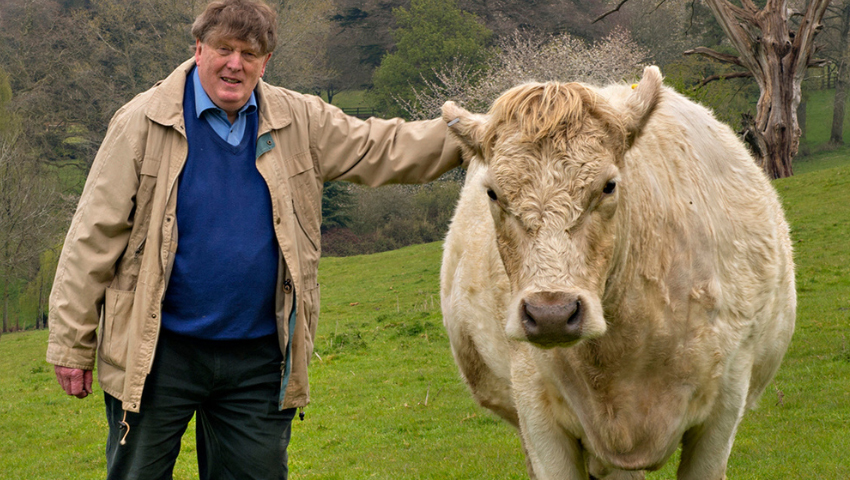By kind permission, we are publishing this homage to Richard Young, written by his friend and colleague Patrick Holden.
I’m writing this in a state of slight disbelief, as I acclimatise myself to the news that my dear friend of 40 years and long-term fellow traveller, Richard Young, is no longer with us. He died, we think peacefully, in his bedroom at Kites Nest Farm near Broadway in the Cotswolds on the morning of Saturday 16 September.
I can’t remember the exact date I met Richard and annoyingly, I can’t phone him up and ask him because without question he would know – and not just the date but probably the time of day.
Anyway, it was probably around 1982 that we met, at a conference organised by British Organic Farmers (BOF) and the Organic Growth Association (OGA). He came up to me, introduced himself and spoke enthusiastically and accurately about how he was doing organic and which crops he was managing to produce at Kites Nest Farm.
This first meeting led to a progressive and incremental engagement between Richard and the emergent organic movement, firstly with British Organic Farmers, and subsequently with the Soil Association, and most recently with the Sustainable Food Trust.
It would be impossible to understate the contribution that Richard made, not only to these organisations but to the understanding of the relationship between farming practices, food quality and health, both in terms of the science and the general public.
Back in the 1980s, BOF and OGA had their own magazine, ‘New Farmer and Grower’, of which he was editor for a couple of years – once again I need to phone Richard to find out the exact dates. He threw himself into this task with enormous enthusiasm and application, as anyone who knew him could imagine. He was a stickler for accuracy, and sometimes would write numerous drafts in order to communicate the idea or the science behind the theme of the article.
Of course this was frustrating to those who worked with him but if one reviews his so-called ‘great works’, on antibiotics, true cost accounting, including reports on The Hidden Cost of UK Food and A Good Life and a Good Death: Relocalising Farm Animal Slaughter, and not yet published but in the pipeline, his latest work on grazing livestock, it would be fair to say that the quality and impact of these reports owed everything to his intellectual rigour and encyclopaedic knowledge and understanding of his subjects.
I think I can say this about him, because he said it himself, that he was slightly “on the spectrum” in the best possible way. In conversation, whatever subject you mentioned he would immediately delve into the detail, sometimes for minutes, sometimes hours, explaining patiently and comprehensively why whatever we were discussing had its roots in good science or otherwise.
I sometimes had the impression that his insistence on backing up everything he said with evidence, was in part related to his slight insecurity about not having a degree, a situation I share with him but unlike Richard, it didn’t prevent me from getting into trouble by stating an opinion derived from experience rather than double blind trials!
To be honest, I think he outflanked most of the scientists with whom he ever connected and that is why so many learned people in the academic community have an enormous respect for what he achieved.
On the subject of being learned, anyone who met Richard, his mother Mary and his sister Rosamund, needed to be alert to their extraordinary and comprehensive knowledge of Shakespeare. As Charles Clover, author of Highgrove, Portrait of an Estate, observed in his book about his meeting with the Youngs, knowledge of Shakespeare’s plays would immediately earn credits if you could find a way to include it in the conversation!
Such was the Young family’s and Richard’s particular influence, that the Prince of Wales (as he then was), visited Kites Nest Farm in 1989, not long after The Prince had initiated the conversion of the Highgrove Estate. It would be definitely true to say that Richard had an enduring influence on Prince Charles, to the extent that he came to rely on Richard to provide back up around his work on antibiotics and other related themes.
On a personal note, he was one of the kindest and most open human beings one could ever meet; towards the end of his life, he was happy in his skin and always generous and interested in everything that happened to the people he encountered. His encyclopaedic memory owed everything to the fact that he was really present to his life, taking in everything that was said and reciting it back even years and sometimes decades later!
I know I am speaking for probably hundreds of people in stating that I count myself lucky indeed to have known him, to have counted him as a friend and who have had the enormous privilege of working with him as part of the wider organic and sustainable food and agriculture movement of which we were both a part.
